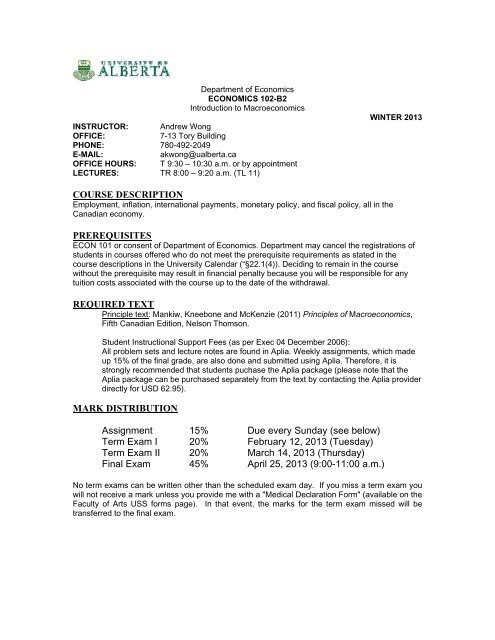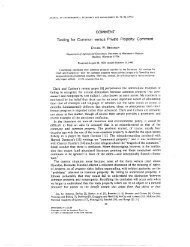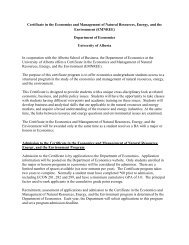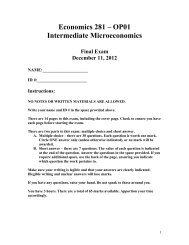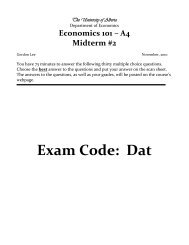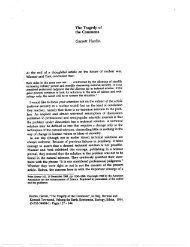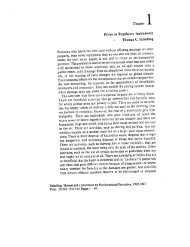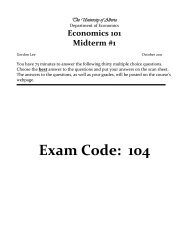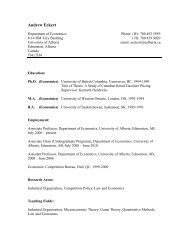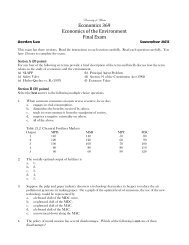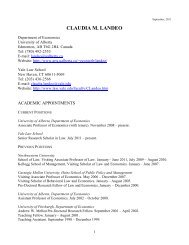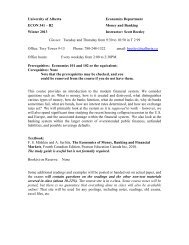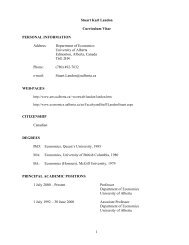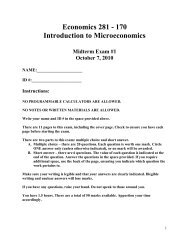102B2 - University of Alberta
102B2 - University of Alberta
102B2 - University of Alberta
You also want an ePaper? Increase the reach of your titles
YUMPU automatically turns print PDFs into web optimized ePapers that Google loves.
Department <strong>of</strong> Economics<br />
ECONOMICS 102-B2<br />
Introduction to Macroeconomics<br />
INSTRUCTOR: Andrew Wong<br />
OFFICE:<br />
7-13 Tory Building<br />
PHONE: 780-492-2049<br />
E-MAIL:<br />
akwong@ualberta.ca<br />
OFFICE HOURS: T 9:30 – 10:30 a.m. or by appointment<br />
LECTURES: TR 8:00 – 9:20 a.m. (TL 11)<br />
WINTER 2013<br />
COURSE DESCRIPTION<br />
Employment, inflation, international payments, monetary policy, and fiscal policy, all in the<br />
Canadian economy.<br />
PREREQUISITES<br />
ECON 101 or consent <strong>of</strong> Department <strong>of</strong> Economics. Department may cancel the registrations <strong>of</strong><br />
students in courses <strong>of</strong>fered who do not meet the prerequisite requirements as stated in the<br />
course descriptions in the <strong>University</strong> Calendar (Ҥ22.1(4)). Deciding to remain in the course<br />
without the prerequisite may result in financial penalty because you will be responsible for any<br />
tuition costs associated with the course up to the date <strong>of</strong> the withdrawal.<br />
REQUIRED TEXT<br />
Principle text: Mankiw, Kneebone and McKenzie (2011) Principles <strong>of</strong> Macroeconomics,<br />
Fifth Canadian Edition, Nelson Thomson.<br />
Student Instructional Support Fees (as per Exec 04 December 2006):<br />
All problem sets and lecture notes are found in Aplia. Weekly assignments, which made<br />
up 15% <strong>of</strong> the final grade, are also done and submitted using Aplia. Therefore, it is<br />
strongly recommended that students puchase the Aplia package (please note that the<br />
Aplia package can be purchased separately from the text by contacting the Aplia provider<br />
directly for USD 62.95).<br />
MARK DISTRIBUTION<br />
Assignment 15% Due every Sunday (see below)<br />
Term Exam I 20% February 12, 2013 (Tuesday)<br />
Term Exam II 20% March 14, 2013 (Thursday)<br />
Final Exam 45% April 25, 2013 (9:00-11:00 a.m.)<br />
No term exams can be written other than the scheduled exam day. If you miss a term exam you<br />
will not receive a mark unless you provide me with a "Medical Declaration Form" (available on the<br />
Faculty <strong>of</strong> Arts USS forms page). In that event, the marks for the term exam missed will be<br />
transferred to the final exam.
GRADE DETERMINATION<br />
“Grades reflect judgments <strong>of</strong> student achievement made by instructors. These judgments are<br />
based on a combination <strong>of</strong> absolute achievement and relative performance in a class. The<br />
instructor should mark in terms <strong>of</strong> raw scores, rank the assignments in order <strong>of</strong> merit, and, with<br />
due attention to the verbal descriptions <strong>of</strong> the various grades, assign an appropriate letter grade<br />
to each assignment.” see Calendar §23.4(4). The <strong>of</strong>ficial grading system at the <strong>University</strong> is the<br />
4-point letter grade system. While instructors may use percentages to aid in their grade<br />
development, percentages are not part <strong>of</strong> the <strong>University</strong>’s <strong>of</strong>ficial grading system. For more<br />
information, please go to www.grades.ualberta.ca.<br />
COURSE OUTLINE<br />
1. Introduction to Economics<br />
Ten Principles <strong>of</strong> Economics Chapter 1*<br />
Thinking Like an Economist Chapter 2*<br />
Interdependence and the Gain from Trade Chapter 3*<br />
The Market Forces <strong>of</strong> Supply and Demand Chapter 4*<br />
2. The Data <strong>of</strong> Macroeconomics<br />
Measuring a Nation’s Income Chapter 5<br />
Measuring the Cost <strong>of</strong> Living Chapter 6<br />
3. The Real Economy in the Long Run<br />
Production and Growth Chapter 7<br />
Saving, Investment, and the Financial System Chapter 8<br />
Unemployment and Its Natural Rate Chapter 9<br />
4. Money and Prices in the Long Run<br />
The Monetary System Chapter 10<br />
Money Growth and Inflation Chapter 11<br />
5. The Macroeconomics <strong>of</strong> Open Economies<br />
Open Economy Macroeconomics: Basic Concepts Chapter 12<br />
A Macroeconomic Theory <strong>of</strong> the Open Economy Chapter 13*<br />
6. Short Run Economic Fluctuations<br />
Aggregate Demand and Aggregate Supply Chapter 14<br />
The Influence <strong>of</strong> Monetary and Fiscal Policy on AD Chapter 15<br />
The Short-Run Trade<strong>of</strong>f between Inflation and Unemployment Chapter 16<br />
ASSIGNMENTS and APLIA<br />
Assignments (total <strong>of</strong> 10) will be done weekly starting with the week <strong>of</strong> January 20, 2013.<br />
There will be two exceptions to this: the weeks <strong>of</strong> the two midterms: Week <strong>of</strong> February 10 th and<br />
Week <strong>of</strong> March 10 th . Assignments will count for 15% <strong>of</strong> the final grade, and will be due according<br />
to the following schedule.<br />
Sunday, January 20 by 10 pm
Sunday, January 27 by 10 pm<br />
Sunday, February 3 by 10 pm<br />
Sunday, February 17 by 10 pm<br />
Sunday, February 24 by 10 pm<br />
Sunday, March 3 by 10 pm<br />
Sunday, March 17 by 10 pm<br />
Sunday, March 24 by 10 pm<br />
Sunday, March 31 by 10 pm<br />
Friday, April 12 by 10 pm<br />
You will notice that assignments are due Sunday nights by 10p.m (except the last one). The<br />
assignments are completed online in Aplia. At the end <strong>of</strong> the term, I will drop the lowest 2<br />
assignment and use your 8 best.<br />
Aplia is the e-learning tool in this class. In order to use Aplia, you must register, using the<br />
following instructions:<br />
1. Connect to http://www.aplia.com<br />
2. Complete the Configuration Test. You must have JaveScript and Flash 6 or later to use<br />
the site. If you don’t, the configuration test will tell you and instructions will follow.<br />
3. Return to the Sign-In page and click “Register here.”<br />
4. You will be prompted to enter your <strong>University</strong> <strong>of</strong> <strong>Alberta</strong> email address and password.<br />
5. You will then asked to enter your course key: 5KNC-Q4RW-DACN.<br />
6. You will have received an Aplia Payment Code for this course. Please remember that<br />
once used, payment codes are not refundable.<br />
7. You only need to register once. After the registration process is complete, you will not<br />
need to enter the course key or the payment code again. You will just log in with your<br />
<strong>University</strong> <strong>of</strong> <strong>Alberta</strong> email address and password.<br />
If you have any questions about registering or using the Aplia website, please contact Aplia by<br />
clicking the Aplia Support Link at the bottom <strong>of</strong> any Aplia page or by emailing support@aplia.com.<br />
Representative Evaluative Course Materials (GFC Feb 2007)<br />
Sample examination questions can be found at the Moodle website. It gives a fair representation <strong>of</strong> length,<br />
nature and level <strong>of</strong> difficulty <strong>of</strong> an actual examination in the course. (GFC 52.8.1)<br />
CODE OF CONDUCT<br />
“The <strong>University</strong> <strong>of</strong> <strong>Alberta</strong> is committed to the highest standards <strong>of</strong> academic integrity and<br />
honesty. Students are expected to be familiar with these standards regarding academic honesty<br />
and to uphold the policies <strong>of</strong> the <strong>University</strong> in this respect. Students are particularly urged to<br />
familiarize themselves with the provisions <strong>of</strong> the Code <strong>of</strong> Student Behaviour (online at<br />
www.ualberta.ca/secretariat/appeals.htm and see attached) and avoid any behaviour which could<br />
potentially result in suspicions <strong>of</strong> cheating , plagiarism, misrepresentation <strong>of</strong> facts and/or<br />
participation in an <strong>of</strong>fence. Academic dishonesty is a serious <strong>of</strong>fence and can result in<br />
suspension or explusion from the <strong>University</strong>.” (GFC 29 SEP 2003)<br />
NOTES<br />
1. It is strongly advisable that the appropriate chapters are read prior to each lecture since it is<br />
generally considered to be an important and helpful approach to the study <strong>of</strong> economics.<br />
2. Regular class attendance is expected. Familiarize yourself with the policy on attendance and<br />
other academic regulations as explained in the Calendar. Students who choose not to attend<br />
lectures must assume whatever risks are involved (see Calendar §23.3 and 23.5.6)
3. Term exam will be written during regularly scheduled classes – duration 45 minutes. Final<br />
exam will be a two-hour long exam.<br />
4. Term exams are not cumulative. Term exams consist <strong>of</strong> multiple choice, problem solving<br />
and short answer questions. No programmable calculators are allowed. The final exam will<br />
be on the whole term’s work. The final exam is scheduled by the <strong>University</strong>. You may not<br />
write this exam at any other time unless you receive permission from your home faculty to<br />
write a deferred exam. It is your responsibility to find out the date, time and place for the<br />
exam. Exam schedules are no longer posted and should be available under Bear Tracks.<br />
5. Students are encouraged to contact the instructor regarding any questions pertaining to<br />
course materials or their performance in the course<br />
6. Supplemental exercises are not permitted in this course. This policy is designed to prevent<br />
students from asking for a make-up assignment to compensate for poor performance on an<br />
exam.<br />
7. Cell phones are to be turned <strong>of</strong>f during lectures except under exceptional circumstances in<br />
which approval has been given by the instructor.<br />
8. Dept <strong>of</strong> Economics General Office is CLOSED FROM 12-1 PM.<br />
9. Policy about course outlines can be found in “§23.4(2) <strong>of</strong> the <strong>University</strong> Calendar.” (GFC 29<br />
SEP 2003).


